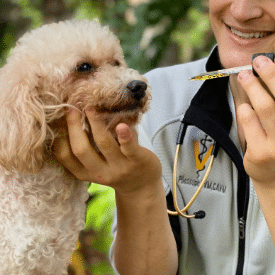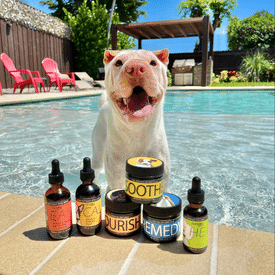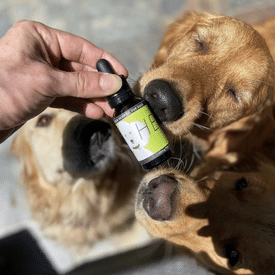Does Pet Insurance Cover CBD?

With the rising costs of almost everything, including vet visits, pet insurance is an excellent idea. Though a common question we see is “Does Pet Insurance Cover CBD?” Depending on the company and your plan, the answer could be yes! Pet insurance may be an easy and affordable way to make sure your vet bills are covered, including CBD products!
Table of Contents
What is Pet Insurance?
Pet insurance acts in many ways like our own health insurance, but the rules and ease of filing are much simpler than our health insurance. Depending on the company, the items and services covered by pet insurance may vary. Understanding the coverage of pet insurance involves delving into the nuances of policies, terms, and conditions.
Generally, pet insurance is designed to cover unexpected and costly veterinary expenses, including accidents, injuries, and illnesses. However, when it comes to holistic treatments like CBD, the waters can become murkier.
How Does Pet Insurance Work?
Pet insurance companies will pay for or reimburse you for paying for veterinary services, depending on your level of coverage. You can adjust your monthly premium by choosing a higher deductible (the amount you must pay out of pocket before coverage kicks in) and co-pay (the amount you pay upfront every visit and don’t receive reimbursement), just like your own health insurance. Put simply, you pay a monthly fee (premium) for a fixed amount of coverage of various vet services, rehab, medications, etc.
Here are some key terms to better understand how pet insurance works:
Pre-Existing Condition: This is a condition or diagnosis given by a veterinary professional before insurance coverage began. Just as in human health insurance, pet insurance often does not cover pre-existing conditions.
Deductible: The amount you must pay out of your pocket before coverage kicks in. For example, let’s say you have a yearly deductible of $250. You go to the vet with your dog for an emergency, and the bill is $1,000. You will pay $250, plus your co-pay amount, of that bill without insurance reimbursing you.
Co-Pay: This is the fixed percentage (usually 10-40%) you must pay AFTER the deductible is applied.
Reimbursement: This is the amount of money your pet’s insurance company pays you. Some insurances will directly work with/pay veterinarians, and the only part you are responsible for is your deductible. Your veterinarian will receive the remainder.
Maximum annual payout: This is the maximum amount your insurance company will pay per policy year. This amount ranges anywhere from $5,000 to unlimited coverage per year. Let’s say you have a $5,000 policy with a 10% co-pay and $250 deductible: Using the previous example: Your bill was $1,000, your deductible was $250. This makes the total billed to insurance $750. If you have a 10% co-pay, you must pay $75. The insurance company would then reimburse you the remaining amount ($675). You still have $4,325 left in coverage.
Most pet insurance companies make it incredibly easy to file a claim. Many use apps that will directly file the claim for you, update you on the claim status, and reimburse you. It’s much easier than human health insurance, that’s for sure!
What Does Pet Insurance Cover?
Coverage can vary widely from company to company, but generally speaking, they can cover:
- Emergency Care
- Surgery
- Exams
- X-Rays & Ultrasounds
- Bloodwork & Diagnostics
- Heredity Conditions
- Rehabilitation
- Medications
- Supplements
- Food
Companies will cover almost anything related to your pet’s care if you’re willing to pay a higher premium. Some insurance companies will cover food (even raw diets!) and supplements. These are the best to look for when choosing a company if you live a more holistic lifestyle with your pet. Ensure there is no cap (limit) on coverage for holistic services like chiropractic and acupuncture, as many insurance companies limit this coverage despite being counterintuitive.
As mentioned before, every company has different coverage limits, so make sure to research them thoroughly before choosing. Switching insurance companies will create pre-existing condition limitations and a lot of headaches, so research research research before buying!
Does Pet Insurance Cover CBD?

When exploring holistic approaches to pet care, many of us have considered incorporating CBD (cannabidiol) into our pets’ routines. However, a common question arises: Does pet insurance cover CBD? When it comes to CBD insurance coverage, the answer can vary, depending on the pet insurance company, as well as your specific plan.
Pet insurance policies are known for their variability, and coverage can differ significantly among providers. Most traditional pet insurance plans may not explicitly cover alternative treatments or supplements, and this often includes CBD. The reason lies in the fact that CBD is still a relatively new player in the pet healthcare landscape, and insurers are adapting to the evolving nature of pet care.
While some pet insurance plans may explicitly exclude coverage for alternative therapies, others might offer a more flexible approach. In certain cases, coverage might extend to CBD if it’s recommended by a veterinarian for a specific medical condition. It’s crucial to carefully review your pet insurance policy or consult directly with your provider to understand the specifics regarding CBD insurance coverage.
Why is CBD Not Covered by Some Pet Insurance Companies?
Typically, pet insurance coverage is contingent on specific conditions. For example, some insurers may only cover CBD if it’s prescribed or recommended by a veterinarian for a diagnosed medical condition. However, it’s worth noting that in most states, that’s not possible.
Considerations also come into play when dealing with pre-existing conditions. The majority of pet insurance policies exclude coverage for conditions existing before the policy’s commencement. So, if your pet’s medical requirement for CBD is considered a pre-existing condition, the insurance may not cover the associated costs.
CBD often falls under the category of alternative or complementary therapies in certain policies. In these instances, coverage might be available but is subject to conditions such as a specific diagnosis or a veterinarian’s recommendation.
It’s crucial to examine the reimbursement percentages as well. Even if your pet insurance policy includes CBD insurance coverage, the percentage you receive back can vary significantly. Some policies offer robust reimbursement, covering a substantial portion of the cost, while others provide more limited coverage, leaving you with higher out-of-pocket expenses.
Additionally, it’s unfortunate that CBD has not been universally accepted in the veterinary community due to a lack of evolution on behalf of regulatory authorities. Cannabis has long been stigmatized and been the subject of a lot of propaganda, and still is. Only recently has modern medicine begun to dive deeper into cannabis research and demonstrate how truly beneficial it is.
Unfortunately, the veterinary medical community is often decades behind the human healthcare industry regarding acceptable treatment options and practices. All this to say, it may not be covered by a pet insurance company because it isn’t widely accepted YET in the veterinary industry. But hope is on the horizon, as less conventional modalities and products have recently been added to insurance coverage, like acupuncture, Assisi loops, and Chinese herbs.
Thankfully, some pet insurance companies are already accepting claims relating to the usage of CBD in veterinary medicine.
What Pet Insurance Companies Offer Coverage for CBD?

The following companies offer CBD insurance coverage under certain conditions:
- Trupanion and Fetch by The Dodo insurance companies may offer coverage if the condition being aided with CBD is not pre-existing.
- Embrace may offer coverage of CBD if the pet is enrolled in their Wellness Rewards program.
- ManyPets may offer coverage of CBD up to $150 per plan policy term.
- MetLife may offer coverage as long as a licensed veterinarian recommends it.
Talking to your Holistic Veterinarian
It’s important to discuss your dog’s need for CBD oil with your holistic veterinarian so that you can get their recommendations appropriately covered by insurance. Most conventional veterinarians do not understand or have a misguided fear of CBD due to antiquated rules and regulations within their community. So, talking to a holistic veterinarian will establish a relationship of understanding regarding your desires for natural options, making filing CBD pet insurance claims more smooth and speedy.
As CBD gains recognition for its potential health benefits for pets, it’s plausible that more pet insurance companies might revisit their policies to accommodate the evolving needs of pets and pet parents. In the meantime, pet parents exploring the use of CBD are encouraged to maintain open communication with their insurance providers, ensuring clarity on the extent of coverage and any potential reimbursement for CBD-related expenses.














